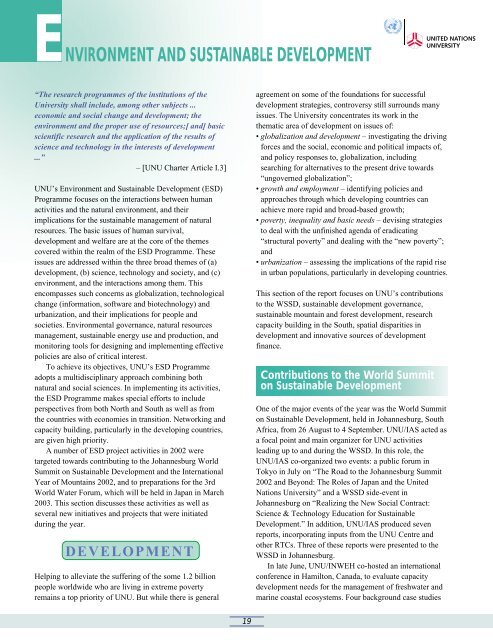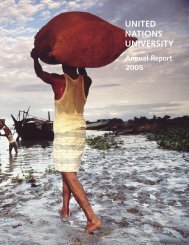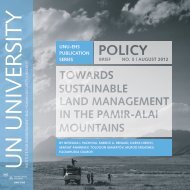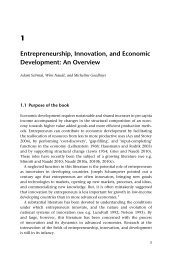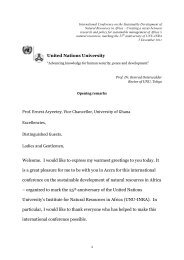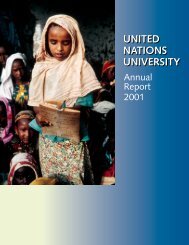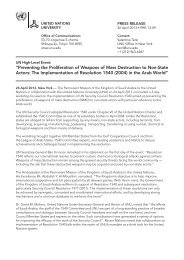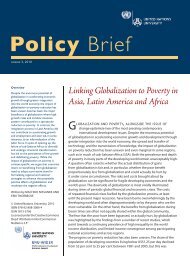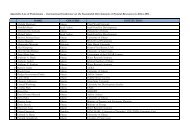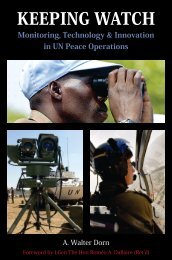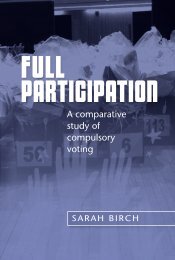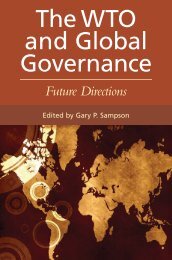Environment and Sustainable Development - United Nations ...
Environment and Sustainable Development - United Nations ...
Environment and Sustainable Development - United Nations ...
You also want an ePaper? Increase the reach of your titles
YUMPU automatically turns print PDFs into web optimized ePapers that Google loves.
ENVIRONMENT AND SUSTAINABLE DEVELOPMENT<br />
“The research programmes of the institutions of the<br />
University shall include, among other subjects ...<br />
economic <strong>and</strong> social change <strong>and</strong> development; the<br />
environment <strong>and</strong> the proper use of resources;[ <strong>and</strong>] basic<br />
scientific research <strong>and</strong> the application of the results of<br />
science <strong>and</strong> technology in the interests of development<br />
...”<br />
– [UNU Charter Article I.3]<br />
UNU’s <strong>Environment</strong> <strong>and</strong> <strong>Sustainable</strong> <strong>Development</strong> (ESD)<br />
Programme focuses on the interactions between human<br />
activities <strong>and</strong> the natural environment, <strong>and</strong> their<br />
implications for the sustainable management of natural<br />
resources. The basic issues of human survival,<br />
development <strong>and</strong> welfare are at the core of the themes<br />
covered within the realm of the ESD Programme. These<br />
issues are addressed within the three broad themes of (a)<br />
development, (b) science, technology <strong>and</strong> society, <strong>and</strong> (c)<br />
environment, <strong>and</strong> the interactions among them. This<br />
encompasses such concerns as globalization, technological<br />
change (information, software <strong>and</strong> biotechnology) <strong>and</strong><br />
urbanization, <strong>and</strong> their implications for people <strong>and</strong><br />
societies. <strong>Environment</strong>al governance, natural resources<br />
management, sustainable energy use <strong>and</strong> production, <strong>and</strong><br />
monitoring tools for designing <strong>and</strong> implementing effective<br />
policies are also of critical interest.<br />
To achieve its objectives, UNU’s ESD Programme<br />
adopts a multidisciplinary approach combining both<br />
natural <strong>and</strong> social sciences. In implementing its activities,<br />
the ESD Programme makes special efforts to include<br />
perspectives from both North <strong>and</strong> South as well as from<br />
the countries with economies in transition. Networking <strong>and</strong><br />
capacity building, particularly in the developing countries,<br />
are given high priority.<br />
A number of ESD project activities in 2002 were<br />
targeted towards contributing to the Johannesburg World<br />
Summit on <strong>Sustainable</strong> <strong>Development</strong> <strong>and</strong> the International<br />
Year of Mountains 2002, <strong>and</strong> to preparations for the 3rd<br />
World Water Forum, which will be held in Japan in March<br />
2003. This section discusses these activities as well as<br />
several new initiatives <strong>and</strong> projects that were initiated<br />
during the year.<br />
DEVELOPMENT<br />
Helping to alleviate the suffering of the some 1.2 billion<br />
people worldwide who are living in extreme poverty<br />
remains a top priority of UNU. But while there is general<br />
agreement on some of the foundations for successful<br />
development strategies, controversy still surrounds many<br />
issues. The University concentrates its work in the<br />
thematic area of development on issues of:<br />
• globalization <strong>and</strong> development – investigating the driving<br />
forces <strong>and</strong> the social, economic <strong>and</strong> political impacts of,<br />
<strong>and</strong> policy responses to, globalization, including<br />
searching for alternatives to the present drive towards<br />
“ungoverned globalization”;<br />
• growth <strong>and</strong> employment – identifying policies <strong>and</strong><br />
approaches through which developing countries can<br />
achieve more rapid <strong>and</strong> broad-based growth;<br />
• poverty, inequality <strong>and</strong> basic needs – devising strategies<br />
to deal with the unfinished agenda of eradicating<br />
“structural poverty” <strong>and</strong> dealing with the “new poverty”;<br />
<strong>and</strong><br />
• urbanization – assessing the implications of the rapid rise<br />
in urban populations, particularly in developing countries.<br />
This section of the report focuses on UNU’s contributions<br />
to the WSSD, sustainable development governance,<br />
sustainable mountain <strong>and</strong> forest development, research<br />
capacity building in the South, spatial disparities in<br />
development <strong>and</strong> innovative sources of development<br />
finance.<br />
Contributions to the World Summit<br />
on <strong>Sustainable</strong> <strong>Development</strong><br />
One of the major events of the year was the World Summit<br />
on <strong>Sustainable</strong> <strong>Development</strong>, held in Johannesburg, South<br />
Africa, from 26 August to 4 September. UNU/IAS acted as<br />
a focal point <strong>and</strong> main organizer for UNU activities<br />
leading up to <strong>and</strong> during the WSSD. In this role, the<br />
UNU/IAS co-organized two events: a public forum in<br />
Tokyo in July on “The Road to the Johannesburg Summit<br />
2002 <strong>and</strong> Beyond: The Roles of Japan <strong>and</strong> the <strong>United</strong><br />
<strong>Nations</strong> University” <strong>and</strong> a WSSD side-event in<br />
Johannesburg on “Realizing the New Social Contract:<br />
Science & Technology Education for <strong>Sustainable</strong><br />
<strong>Development</strong>.” In addition, UNU/IAS produced seven<br />
reports, incorporating inputs from the UNU Centre <strong>and</strong><br />
other RTCs. Three of these reports were presented to the<br />
WSSD in Johannesburg.<br />
In late June, UNU/INWEH co-hosted an international<br />
conference in Hamilton, Canada, to evaluate capacity<br />
development needs for the management of freshwater <strong>and</strong><br />
marine coastal ecosystems. Four background case studies<br />
19


